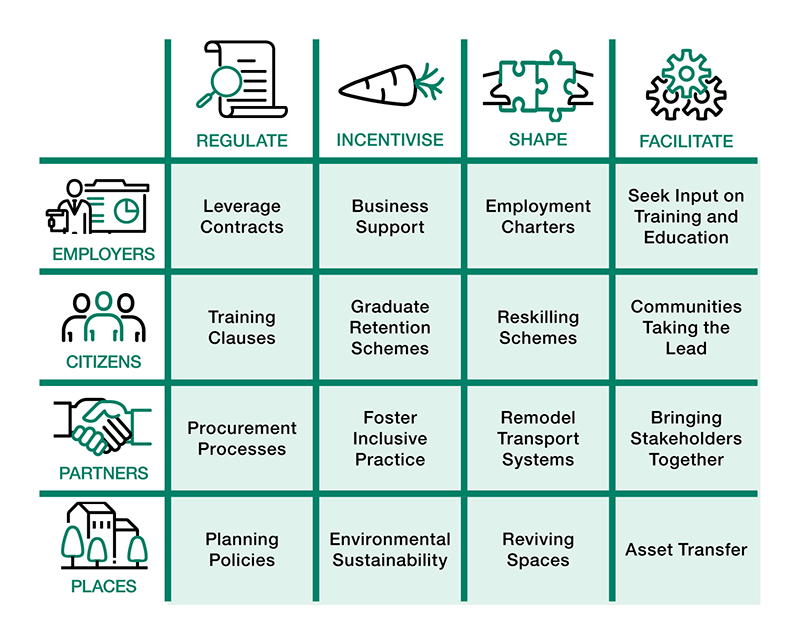Policy Researcher at NLGN, Luca Tiratelli, provides insight into the key recommendations of their recently published guide for local authorities looking to take inclusive growth theory and turn it into practice.

The report, produced in partnership with Barrow Cadbury Trust, identified 16 separate policy levers that councils could pull to transform their local economies – taken together, these represented a potentially radical break in local economic thinking. Our aim was to supply the local government sector with the tools they needed to “get started” on inclusive growth, as the feedback we were getting from out network was that people were interested in the concept, but unsure how to proceed.
However, despite being just a few weeks ago, February now represents a bygone economic age. The problems of the pre-Covid era – such as how we ensure that everyone benefited from an unprecedentedly long period of growth, or how we addressed Britain’s productivity crisis, have either been rendered redundant or are dwarfed by current events. We are in the midst of an economic shock the likes of which have not been known in living memory. The long-term effects of this are, at this point, unknowable, but we can fairly sure that it’s going to mean that growth is off the menu for the foreseeable future.
What does it mean then, for inclusive growth, as an agenda, if there is no growth? Some may think of inclusive growth as a kind of fair-weather friend – a worthy intellectual exercise for the good times, but not much use when the going gets tough. Such a reading of the agenda would however totally miss the point of inclusivity.
As an economic approach, inclusive growth is an ethos – a lens through which to look at local economic problems – rather than a policy in itself. Councils still have at their disposal valuable ways to create more equitable and inclusive local economies, something that has been made all-the-more necessary by this crisis. As such, the ideas that underpin inclusive growth are now more relevant than ever, even if economic realities mean we talk about redistributing existing wealth, rather than creating new riches.
So how can local authorities foster inclusive growth?
See the graphic below showing the framework of policy levers that we identified. How might these play out, in our new, no-growth world?

To take one example, one of the levers based around regulation concerns how councils leverage their procurement processes to bring about inclusivity. Looking to Preston’s much-lauded “community wealth building” approach for inspiration, we encouraged councils to think about themselves as “anchor-institutions” with an almost unique ability to shape their local economy. By directing their own spending, where possible, to local suppliers and businesses, it is possible to initiate virtuous cycles in the local economy, which make it more inclusive and prosperous. Evaluation findings from Preston suggest that this kind of approach can lead to hundreds of millions of pounds remaining in the local economy, money that would otherwise have ended up elsewhere.
This kind of approach to inclusive growth is something that is not rendered any more difficult or any less desirable by our changing economic fortunes.
Similarly, leveraging contracts to try and enforce good behaviour on the part of businesses remains an option. As does investing in reskilling schemes. As does remodelling transport infrastructure with inclusivity in mind, or creating an employment charter, or indeed any of the levers presented above.
Of course, in the abstract, inclusive growth is about growth. As a concept it was born out of the observation that in many countries, growing economies were not producing improvements in living standards or wellbeing. The theory was about recognising this gap, between the abstract and the real economy, and trying to bridge it.
However, in particular, and in practice, inclusive growth has always been about an approach to a wide variety of policy areas that is applicable regardless of whether the national GDP numbers are going up. This kind of approach, that is about trying to ensure that activities are inclusive of everyone, and that both benefits and costs are shared as equally as possible, is more relevant now than ever. Those charged with managing local economies over the coming years would do well to keep that in mind.
Further information:









